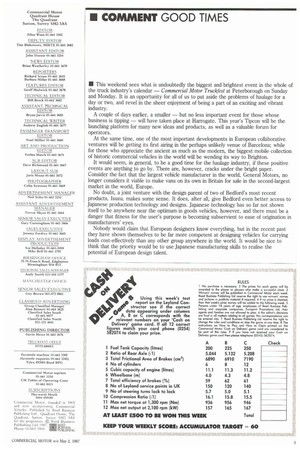• This weekend sees what is undoubtedly the biggest and
Page 5

If you've noticed an error in this article please click here to report it so we can fix it.
brightest event in the whole of the truck industry's calendar — Commercial Motor Truckfest at Peterborough on Sunday and Monday. It is an opportunity for all of us to put aside the problems of haulage for a day or two, and revel in the sheer enjoyment of being a part of an exciting and vibrant industry.
A couple of days earlier, a smaller — but no less important event for those whose business is tipping — will have taken place at Harrogate. This year's Tipcon will be the launching platform for many new ideas and products, as well as a valuable forum for operators.
At the same time, one of the most important developments in European collaborative ventures will be getting its first airing in the perhaps unlikely venue of Barcelona; while for those who appreciate the ancient as much as the modern, the biggest mobile collection of historic commercial vehicles in the world will be wending its way to Brighton.
It would seem, in general, to be a good time for the haulage industry, if these positive events are anything to go by. There are, however, cracks under the bright paper. Consider the fact that the largest vehicle manufacturer in the world, General Motors, no longer considers it viable to make vans on its own in Britain for sale in the second-largest market in the world, Europe.
No doubt, a joint venture with the design parent of two of Bedford's most recent products, Isuzu, makes some sense. It does, after all, give Bedford even better access to Japanese production technology and designs. Japanese technology has so far not shown itself to be anywhere near the optimum in goods vehicles, however, and there must be a danger that fitness for the user's purpose is becoming subservient to ease of origination in manufacturers' eyes.
Nobody would claim that European designers know everything, but in the recent past they have shown themselves to be far more competent at designing vehicles for carrying loads cost-effectively than any other group anywhere in the world. It would be nice to think that the priority would be to use Japanese manufacturing skills to realise the potential of European design talent.




























































































































